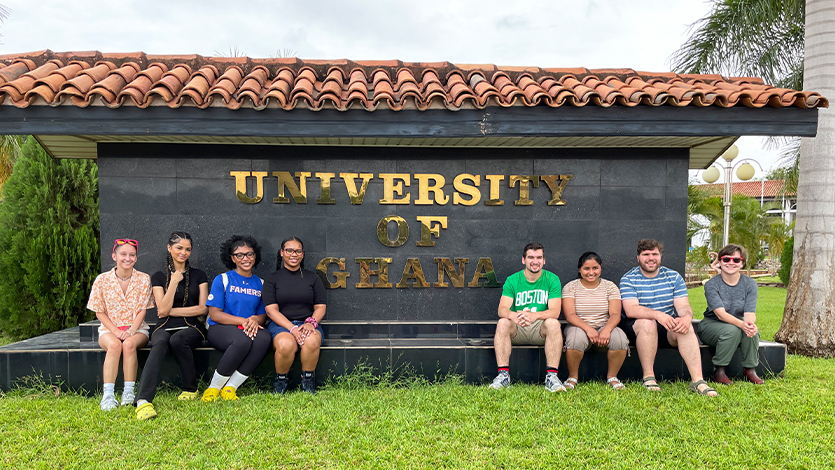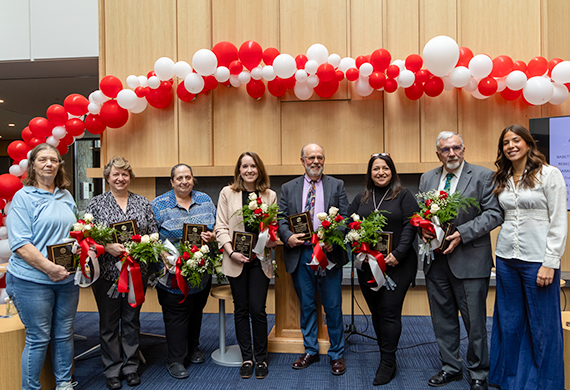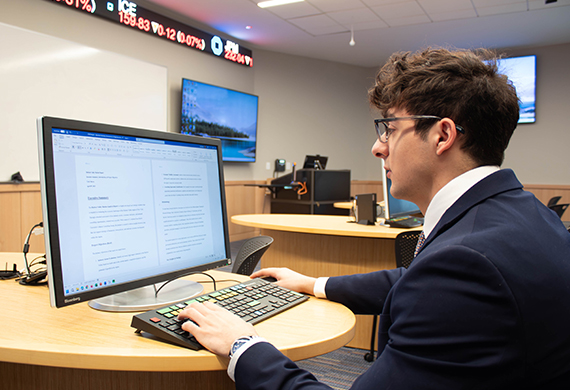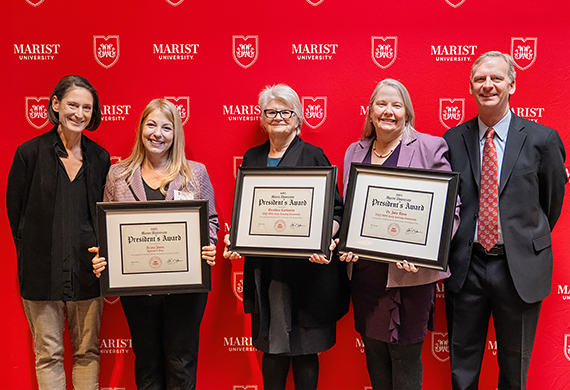Music, Healing and Spirituality for Marist Students in Ghana

July 28, 2022 – A group of Marist students visited West Africa soon after the end of the spring semester to study the connection between the arts, African religious expressions, and healing. The students were part of Dr. Gavin Webb’s spring attachment course called Music, Healing, and Spirituality in Ghana. Some 5,000 miles away from Poughkeepsie, the course is described as investigating the symbiotic relationship between religious expression, music, dance, and medicinal practices by investigating specific religious institutions. It was the first time Marist ran international programming in Ghana since the Ebola crisis struck parts of West Africa in 2014.
Students arrived in Ghana on May 23 and immediately embarked on their two-and-a-half-week journey across southern Ghana. The following day, they began to immerse themselves in Ghanaian culture with an orientation at the University of Ghana. There, the group of eight from Marist were introduced to some of the cultural expectations, health and safety issues, and an overview of what they would be learning throughout their time in West Africa.
The program culminated with a week-long experience in the community of Klikor in southeastern Ghana near the border with Togo where students carried out ethnographic fieldwork based on topics developed during the semester, and which were appropriate to the program theme.
Dr. Webb, a musician, and ethnomusicologist is no stranger to the culture in Ghana. He received his Master’s and Ph.D. in musicology from the University of Ghana. He spent 14 years there where he oversaw fully-accredited undergraduate international education programs both from within Ghana, and later across the African continent.
"While this course resides in the Music Department, our study of what might best be described as African Traditional Religion required a cross-disciplinary approach," said Dr. Webb. "Through the course and field experience in Ghana, students studied how religious expressions in Africa and the Diaspora integrate music and dance, herbalism, trance or altered states of consciousness, and ritual to address various physiological or psychological afflictions. The dispersion of African religions, both internally as well as across the Caribbean and Americas, required some understanding of history and contemporary issues across the black Atlantic."
Photo courtesy of Dr. Gavin Webb
The Marist students furthered their initial research by partaking in cultural workshops and site visits while in Ghana. Some topics included kente weaving, batik making, music and dance, visits to local shrines, and more.
After spending the first few days in Accra, the capital of Ghana, the class traveled to the Cape Coast where they visited the Cape Coast Castle, as well as the Elmina Castle-Dungeon.
"I am glad that I had the opportunity to visit Elmina Castle and Cape Coast Castle, where we stepped inside the very dungeons where slaves were held until it was time for them to take their journey to the Americas," said Phyia Walker '24. "The information and experiences I had on this trip are invaluable and will always be something I hold dear to my heart."
The trip then moved to Kakum National Park, one of Ghana’s most visited attractions. Located in the Assin Attandanso Reserve, students got to view picturesque scenery, captivating wildlife, and much more. Following their excursion through the rainforest, the class headed back to the capital city of Accra to continue their expedition in Ghana’s Volta Region, which included a stop in the village of Dagbamete to visit the Apetorku Shrine and witness a ceremony.
"The fieldwork experience in Klikor, in southeastern Ghana required students to incorporate the principles and procedures of ethnography," said Dr. Webb. "In other words, a lot was asked of them, and I couldn’t have been more pleased with how well many of them did navigating these disparate topics while adjusting to life and culture in Ghana!"
Upon their return, students used their research to write their final paper which encapsulated their semester both on campus and abroad in Ghana.
"Out of all the semester attachments available this past semester, the program for Ghana was the most interesting and offered subjects that I was interested in: music, healing, and religion," said Angelina Zacharias '22. "I was also grateful to be surrounded and supported by an amazing group that were willing to step out of their comfort zone and experience different things. I am glad I had this opportunity and it will be one that I will remember for the rest of my life."
"Being able to study and experience a culture that is not only so different from our own, but so enriched in healing and spirituality made my experience here at Marist," said Benjamin Williams '22. "It was the perfect way to end my undergraduate education, having walked commencement the day before getting on the plane with my classmates."
Attachment Classes and Study Abroad
Marist offers a number of faculty-led attachment programs that vary in scope. Students register for the course and attachment that are delivered during the spring semester as the means for enrolling.
Marist’s Study Abroad program is ranked second in the nation among master’s-granting institutions for semester and academic-year abroad as well as total number of students studying abroad in the most recent Open Doors Report on International Educational Exchange. The report also ranked the college seventh overall in undergraduate study abroad participation rate.
Marist has received the Senator Paul Simon Award for First Year Abroad programs in Italy and Ireland and also features an annual roster of innovative, faculty-led international and domestic travel programs.



